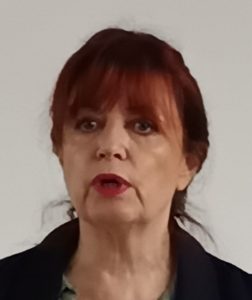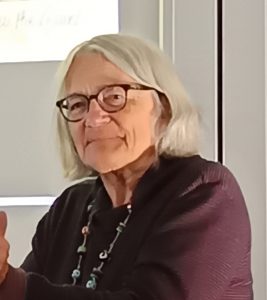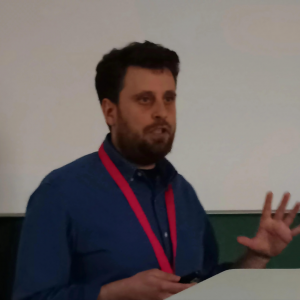On September 24th, the panel “From Analog to Digital” of the DG Phil Working Group on Women in the History of Philosophy and the IAPH took place at the XXVI. DG Phil Congress of Philosophy in Münster.
Within the panel, four outstanding researchers presented their work on the implementation of feminist theories, women’s works and voices, and historical examples of women philosophers from the natural sciences into the canon of philosophy. With the core concept “From Analog to Digital”, the speakers presented their visions of how the canon of philosophy can be reoriented in a digital way.
 First, Cristina Sánchez Muñoz (Autonomous University of Madrid) gave her lecture on Political Violence and Gender. Exclusions, Reductions and Challenges. She presented the urgent need to adapt political and social actions in cases of violence against women who suffer under the conditions of war. Sexual violence has been a weapon and a threat to women for centuries, which has reached its peak in the recent and current experiences of women in modern wars such as the Israel-Gaza conflict, the civil war in the Congo, and the Russian-Ukranian war. Sexual violence within these wars is also becoming a digital sphere today, as digital sexual violence violates and threatens women in ways that are almost impossible to stop (the Internet never forgets).
First, Cristina Sánchez Muñoz (Autonomous University of Madrid) gave her lecture on Political Violence and Gender. Exclusions, Reductions and Challenges. She presented the urgent need to adapt political and social actions in cases of violence against women who suffer under the conditions of war. Sexual violence has been a weapon and a threat to women for centuries, which has reached its peak in the recent and current experiences of women in modern wars such as the Israel-Gaza conflict, the civil war in the Congo, and the Russian-Ukranian war. Sexual violence within these wars is also becoming a digital sphere today, as digital sexual violence violates and threatens women in ways that are almost impossible to stop (the Internet never forgets).

Ursula Martin (Oxford University), with her talk on Mary Somerville and Ada Lovelace: networks in the making of nineteenth-century British science introducedthe audience into the research and entanglements of Mary Somerville and Ada Lovelace as an example of theories from the analog to the digital. Mary Somerville’s contributions to the field of mathematics demonstrated a proficiency in analog expertise that served as the foundation for Ada Lovelace’s theories on computing and her work with Charles Babbage’s computing machine.
Sabine Thürmel (Technical University Munich) presented in her talk Current Developments in Computer Science from the Perspective of Women in the Humanities the ideas and research of five different active women researchers and their scientific development in computer science at the TU Munich. Her concept of the Female SeniorGens, Female NowGens and Female NextGens showed this diverse development and growth of female thinkers in the field of STEM.
 The final presentation, Philosophical Connections: Exploring the Digitization of Brazilian Women Philosophers from Paderborn to Brazil was given by Pedro Pricladnitzky (Center HWPS/Paderborn University). He introduced one of the core activities of the Center: the digitization project. In his presentation, he outlined his personal research related to the women philosophers of Latin America and Brazil. Using three exciting examples of Brazilian women philosophers, Nísia Floresta (1810-1885), Josefina Álvares de Azevedo (1851-1913), and Françisca Maria Xavier (unknown), he explained how the Center is preserving texts and theories by women philosophers and making them digitally accessible.
The final presentation, Philosophical Connections: Exploring the Digitization of Brazilian Women Philosophers from Paderborn to Brazil was given by Pedro Pricladnitzky (Center HWPS/Paderborn University). He introduced one of the core activities of the Center: the digitization project. In his presentation, he outlined his personal research related to the women philosophers of Latin America and Brazil. Using three exciting examples of Brazilian women philosophers, Nísia Floresta (1810-1885), Josefina Álvares de Azevedo (1851-1913), and Françisca Maria Xavier (unknown), he explained how the Center is preserving texts and theories by women philosophers and making them digitally accessible.
You cannot copy content of this page








